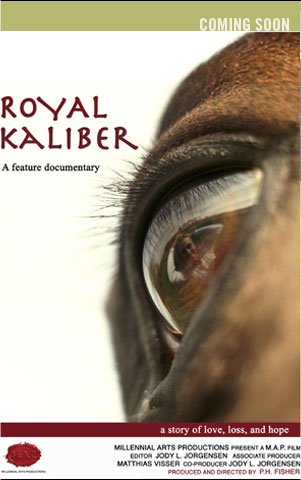Royal
Kaliber
A Feature Documentary
Synopsis
Before little boys and girls grow up and fall
in love with one another, they fall in love with horses ... forever.
It’s
a first love that can transform lives: an otherwise reluctant
boy clutches his mare’s mane and hangs on for dear life
on his first wild ride; a shy girl in pig-tails gazes up into
her own reflection in her pony’s mysterious eye, and sees
eternity.
ROYAL KALIBER plays out the very human love affair with
horses on the very grown-up world stage of professional show
jumping — a
seemingly genteel sport that’s revealed to be rife with
very adult stresses. Show jumping horses and riders compete in
a nail-biting and dangerous pressure cooker where medals are
won on fractions of a second and where one rail down can doom
a year’s effort and trigger the most adult of anxieties — failure.
Continuing
her revelatory explorations of the connection between psyche
and performance that she began in FINDING ELEAZAR, the opera
documentary profiling tenor Neil Shicoff, director/producer Paula
Heil Fisher went looking for the soul of show jumping and found
Royal Kaliber, the 2003 “Horse of the Year,” and
Chris Kappler, the quiet superstar Grand Prix rider who had already
matched his age with 34 wins on the circuit. This unstoppable
pair dominated the world of show jumping in 2003, and then reached
the 2004 Olympics in Athens in peak form ready for that one flawless
minute — that one perfect ride. For Royal and Chris, gold
was just one fence away.
But ROYAL KALIBER is not just a sports
documentary. It is the story about two beings in perfect harmony,
about that once-in-a-lifetime combination of a magnificent creature
and the rider who had the hands, the heart and the patience to
refine 1500 pounds of testosterone and muscle into the Nureyev
of show jumping. ROYAL KALIBER is about how one would not have
achieved greatness without the other. And about how if tragedy
strikes one, the other falls, too.
When Royal Kaliber is injured
in a freak accident, the story takes a turn not unlike the gripping
story of Barbaro, the racehorse who captured the media spotlight
and the nation’s affection
after a horrible misstep a few strides into the Preakness shattered
his right hind leg. As Royal battles for his life, the film becomes
a poetic exploration of triumph, loss, recovery ... and hope.
“I’ve always been attracted to horses,” says
Fisher, “and I wanted to find a story that could express
how horses capture our imagination in a mysterious, even mythical
way. These are large and powerful animals, and yet they are fragile.
They are beautiful and soulful and affectionate, and they are
moody. They are intelligent, and they are simple. They are Gods,
and they are children. As we do with our children, we project
ourselves on them; we pin our hopes on them. They reflect our
emotions — our calm, our peace as well as our insecurities
and fears. They can be influenced but not controlled. When we
lose a horse, we feel pain and grief. We want to fill the emptiness
with another. Like having another child. The heart of the film,
to me, is how sport imitates life, how competition on the Grand
Prix level is more than an athletic test. It’s an exploration
of the intimate bond between horses and the people who love them.” |

Aside from the focus on Royal and Chris, though, the
film also shows how the sport really revolves around
the rhythms of an animal and the “horse people” who
care for them. We meet two lovable characters — Chris’ wife
and barn-manager Jenny Kappler and Royal’s delightful
groom Luis Hernandez. To them, Royal is part of their
family and caring for him is a reflection of their inner
goodness. Their investment in Royal is utterly complete,
no less than a parent’s loving devotion to a child.
To them, life with horses is its own reward.
During Royal
and Chris’s journey to the Olympics,
there’s another side show going on. Fisher slips
behind-the-scenes to affectionately poke fun at the big
business of professional show jumping, a sport where
an army of specialists — acupuncturists, blacksmiths,
dentists, farriers, fertility specialists, internists,
physical therapists, sports psychologists, trainers and
vets — cater to a Grand Prix horse’s every
perceived need. We also hear from other riders, generous
owners and wealthy patrons, as well as security guards,
television analysts and the quirky show course designers.
Another segment explains how top riders and their agents
must tirelessly “shop” for the next million-dollar
breakthrough horse in a business where you’re only
as good as your next horse. As one horse owner quips, “it’s
like rooting around in the woods for mushrooms.”
Then we meet the legendary George H. Morris, who one
Grand Prix rider describes as the “John McEnroe
of our sport.” He’s the hard-shelled coach,
mentor, disciplinarian and technician who hectors Chris
and Royal, along with Jenny and Luis, to the 2004 Olympic
Games. But he also intuitively knows when a pound of
sugar will do the trick.
ROYAL KALIBER transports viewers
to some of the biggest competitive venues in show jumping,
including Wellington, The Hamptons, Tampa and the 2004
Olympics, but it also takes them to the very special
world beyond these colorful stages.
“I wanted to make a poem that captures the utter
joy and beauty of living with horses,” says Fisher, “but
in a context of the excitement of a competition that
tests the bonds between a rider and his horse.” For
Fisher, every trip around a show jumping course is a
metaphor for the challenges of life.
|